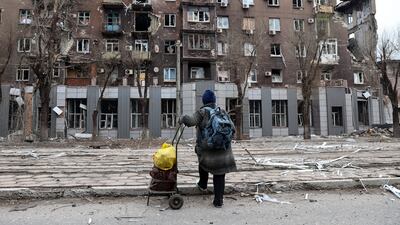Live updates: follow the latest news on Russia-Ukraine
When the 7-year-old boy and his sister, 5, spotted a plane overhead, their first instincts were to find cover from what appeared to be an inevitable attack.
The children, from the heavily-bombed Ukrainian city of Mariupol, had become accustomed to diving for the nearest basement at the sound of danger above.
In fact, the pair were now safe in Romania after crossing the border. The plane was a harmless passenger flight, but the trauma of weeks of bombing of their home city by Russia had taken its toll.
The children are now in the care of a team that includes more than 300 psychologists, mostly Ukrainian, as part of a project helping the families of seafarers escaping war.
The area of Russian control and attacks includes parts of eastern Ukraine, which are home to the besieged country's significant maritime industry.
Month-long contracts for seafarers have meant that some have remained at sea since the start of the invasion and shipping companies have scrambled to help the families left behind.
“For seafarers, one of the most important things to ensure their mental health is knowing that their families are safe,” said Charles Watkins, chief executive of Mental Health Support Solutions, which is running the project and works closely with the maritime industry. “We’re seeing a lot of children having a lot of difficulties processing the war.”
He has recruited the psychologists as part of a €1.4 million project run and funded by Columbia Shipmanagement, which has 600 sailors from Ukraine and 800 from Russia on board the hundreds of vessels it manages.
Most of the psychologists who are working on the programme have also fled war. “They are aware from their training that helping others is helping themselves,” said Mr Watkins.
The project leaders have taken over a hotel in Romania and serviced apartments in Poland to act as safe havens for families for up to six months as they seek to resettle in other countries. It has also set up four rendezvous points in Russia, Poland, Ukraine and Romania for families who need food, clothing and accommodation.
Mr Watkins said the centres had been set up in neighbouring countries to ensure that those affected by the hidden traumas of war can have treatment as quickly as possible. “The earlier you treat the mental issues, the higher the chances that they will be OK,” he said.
About 95 per cent of those turning up are women and children, with Ukrainian men aged 18 to 60 ordered to stay in the country to fight under martial law. The psychologists are running group and art therapy classes and organising longer-term counselling sessions.
Mr Watkins said that the number of sailors calling a specialist mental health helpline from ships had also trebled, with 120 people contacting it in the past three weeks.
They included Ukrainian sailors concerned about conflicts on board ships with fellow Russian crew members. Managers have encouraged them not to discuss the war for fear of stoking conflict on board.
The two countries are vital to staffing the world’s merchant fleet; Russian seafarers represent more than 10 per cent of the 1.89 million global workforce, while Ukraine supplies 4 per cent. The majority of Ukrainians are trained officers.
The family support system has significantly helped to reassure officers and crew that their relatives are being looked after so they can concentrate on complex systems on board ships such as gas tankers, said Mark O’Neil, president and chief executive of CSM.
“These are complicated machines and they require trained crew and a focused crew,” he said. “A crew member worrying about his family escaping from Ukraine and being looked after is not a focused crew member.
“The situation in Ukraine is deeply distressing, far more so for those directly impacted, and providing accommodation and psychological help is the least we can do.
“It is all about the victims of the conflict, whether they are Ukrainian, Russian, Georgian or Filipino, it doesn’t matter. They are the victims.”

